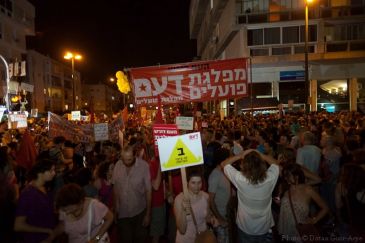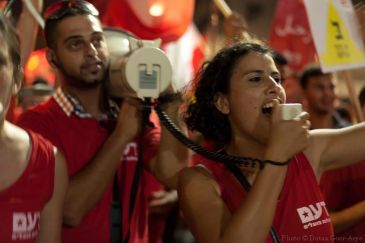The Protest March Of September 3—Where To?
By Yacov Ben Efrat
06 September, 2011
Challenge-mag.com
Saturday, September 3, was the Saturday of the citizen in Israel. The protest movement brought 460,000 people onto the streets to create a new socio-economic agenda. No government can remain indifferent to that many calling, “The people demands social justice!” The hope is to gain a new social contract, which will overthrow neo-liberal capitalism and create in its place a welfare state.

Tel Aviv, Sept. 3, 2011. The ODA contingent with banner: "The people demands Da'am, the Workers' Party!"
What is Daphni saying?
Daphni Leef, the natural leader of the tent protest, defines the movement as “political but not partisan.” According to this view, the political system, including the parties and the Knesset, have failed to understand the feelings of the people, who are calling on them to descend from their lofty towers and see that the country is falling apart.
The word “party” terrifies the leaders of the protest. A “party” (in Hebrew, the word has an etymological root meaning split, section or division) requires a worldview and clear ideological agenda, which necessarily causes criticism and draws antagonism from others. Let’s take for example Labor Party candidate Shelly Yechimovich, who has fought tirelessly and fearlessly against the tycoons and enjoyed a wide public consensus. The moment she revealed her political views, declaring she has no problem with the settlements, she attracted antagonism. But if the protest movement avoids “politics” in order to avoid division, it ends up leaving politics to the same deaf politicians who scurry to do the bidding of big capital. It’s a closed circuit.
So what do we have? A political movement without political tools to realize its objectives. And the more support it receives, the greater the internal contradiction. The movement’s problem is its inability to translate popular support to political power, in other words, a political party, which can take responsibility, aim to enter the government, win a majority in the Knesset and anchor in law the social contract which currently enjoys wall-to-wall support.
The protest movement decided that the way to avoid antagonism is to stick with the slogan “social justice,” which has become the new state anthem, and purposefully avoid critical issues such as occupation, settlement, war and peace. According to this approach, the fact that Binyamin Netanyahu (“Bibi”) is an unabashedly rightwing leader needn’t disturb anyone, because nobody’s asking him to make “political” changes, but only “social” changes. Netanyahu can stick with the occupation while working toward “justice” within Israeli society – especially within the Israeli middle classes who serve the state loyally and struggle under the burden of the morally uninhibited tycoons. This is the significance of the slogan, “Let us live in this country!”
However, the chances of Netanyahu meeting these demands are no greater than the chances of him meeting Palestinian demands for “distributive justice” – the two-state solution. Betting on Bibi ensures that the Palestinians remain stateless and Israeli citizens remain without the social justice they demand.
What does ODA say?
The Organization for Democratic Action (ODA)—Da'am in Arabic—has taken part in the protest movement right from the start. For the past five years, we have marched alone along Tel Aviv’s chic boulevards demanding fair employment terms, equality for women, the right to unionize, equality between Arabs and Jews and peace. Thus it was only natural for us to join the thousands of youth who woke up and discovered the flames had reached their door after consuming every last morsel in Yeruham, Hadera, Kufr Qara and Nazareth.

Asma Agbarieh-Zahalka of ODA leading the chants, Tel Aviv, Sept. 3, 2011
The ODA is not a middle-class party. It is a workers’ party, which lives and breathes “social” issues and fights tooth and nail to change the system to serve the workers (including the middle classes) instead of capital. The ODA is not like all the other parties. It is a revolutionary party.
The revolution it aims for is a revolution in consciousness. This too begins with change in the order of priorities, a change which will not be brought by the middle classes but by the working class – because Jews and Arabs meet over their wage slips as they struggle to get by.
This change cannot be limited to an awakening from indifference. This is a necessary but not a sufficient condition. Change in consciousness must address Arab workers in Israel, the Palestinian workers under Israeli occupation, and all workers in the Arab world. The ODA does not believe in a fleeting consensus; thus it works fearlessly and without prejudice to generate a new workers’ consensus which crosses national boundaries. It does not shrink from facing reality even when reality is complex and difficult.
What will cause real change in the struggle for social justice is the participation of those millions of workers, the 50% of wage earners who don’t even reach the tax threshold, who have not yet found the strength to break free of their despair. So far, they have been conspicuously absent from the protest movement, but the ODA has not forgotten them. In the fight against worker organization, which the government calls “making the labor market more flexible,” we see a destructive and merciless war – as is evident from the struggles at Haifa Chemicals and the Salit Quarry, or in the plight of the social workers and the medical interns.
The start of a new era
The current social movement is the opening volley of a new era. Despite its shortcomings, it has exposed the nakedness of the distorted social order, clearly pointed out its ills, and formulated a comprehensive agenda which has become a worthy basis for further action.
Despite Netanyahu’s bragging, the neoliberal capitalist system which he so admires has led his beloved US to the edge of the precipice. Israel is marching confidently towards a future without an economy and without peace. The protest movement cannot continue sitting on the fence, expecting our present leaders to save us.
Some will accuse us of seeing only the dark side. To them we reply: Since the USSR collapsed, the world has been unipolar. The American right has been implementing global predatory capitalism. Despite this dark picture, we do not sit idle; we continue to do the hard labor of building up a workers’ party, for we believe it is possible to generate change. To our delight, after 30 years the Arab world and some European states are awakening and challenging the existing social order, just as we do.
Therefore we, workers from all sectors, Arabs and Jews, marched to the square on Saturday with a clear message: Bibi, your time is up, go home! We marched with a socialist worldview, according to which the economy should exist to serve society, not capital. Those who fail to overcome the capitalist brainwashing will remain slaves to the tycoons and their lackeys in the Knesset.
The socialism in which we believe has become more relevant than ever, because the welfare state is a socialist state . This is a state which does justice to its citizens without regard to religion or ethnicity. A state such as this can be integrated into the region and become a partner to the democratic changes sweeping the Arab world. This cannot happen unless the occupation is brought to an end. Those who truly struggle for social justice must seek universal justice. There will be no true welfare state until the occupation is ended!
Translated by Yonatan Preminger
CHALLENGE is a bi-monthly leftist magazine focusing on the Israeli-Palestinian conflict within a global context. Published in Jaffa by Arabs and Jews, it features political analysis, investigative reporting, interviews, eye-witness reports, gender studies, arts, and more. This article first appeared in Challenge
Comments are not moderated. Please be responsible and civil in your postings and stay within the topic discussed in the article too. If you find inappropriate comments, just Flag (Report) them and they will move into moderation que.


